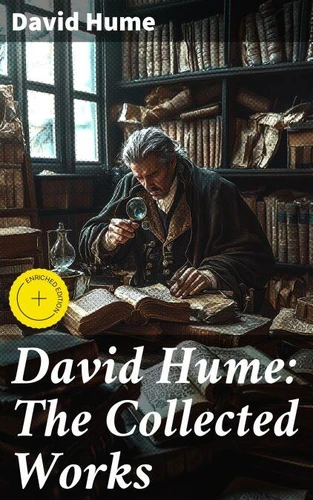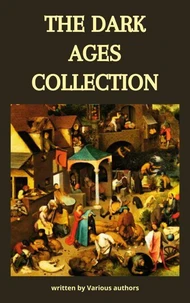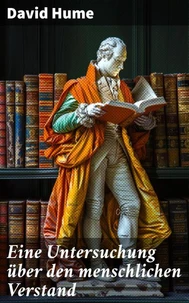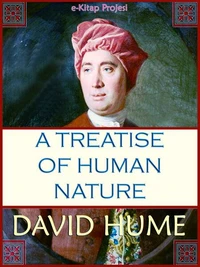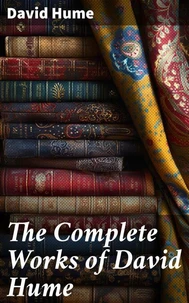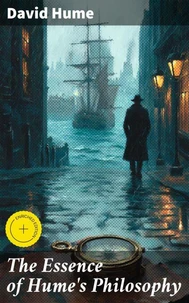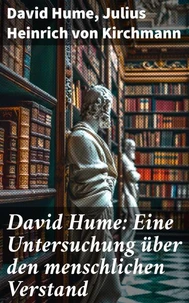David Hume: The Collected Works. Enriched edition. Exploring Empiricism and Skepticism in 18th Century Philosophy
Par : ,Formats :
Disponible dans votre compte client Decitre ou Furet du Nord dès validation de votre commande. Le format ePub est :
- Compatible avec une lecture sur My Vivlio (smartphone, tablette, ordinateur)
- Compatible avec une lecture sur liseuses Vivlio
- Pour les liseuses autres que Vivlio, vous devez utiliser le logiciel Adobe Digital Edition. Non compatible avec la lecture sur les liseuses Kindle, Remarkable et Sony
 , qui est-ce ?
, qui est-ce ?Notre partenaire de plateforme de lecture numérique où vous retrouverez l'ensemble de vos ebooks gratuitement
Pour en savoir plus sur nos ebooks, consultez notre aide en ligne ici
- Nombre de pages826
- FormatePub
- ISBN859-65--4779385-4
- EAN8596547793854
- Date de parution30/12/2023
- Protection num.Digital Watermarking
- Taille2 Mo
- Infos supplémentairesepub
- ÉditeurGOOD PRESS
Résumé
David Hume: The Collected Works presents a comprehensive anthology of the philosophical writings of one of the most pivotal figures of the Scottish Enlightenment. This meticulously curated collection includes seminal texts such as *A Treatise of Human Nature* and *An Enquiry Concerning Human Understanding*, showcasing Hume's distinctive empiricist approach and his skepticism towards metaphysical speculations.
Through clear, accessible prose enriched by a masterful command of language, Hume invites readers into profound explorations of human psychology, morality, and epistemology, contextually situated within the intellectual currents of 18th-century thought. David Hume (1711-1776), a Scottish philosopher, historian, and essayist, is celebrated for his pioneering contributions to modern philosophy, particularly in the realm of empiricism and naturalism.
Influenced by the Enlightenment's rational spirit, Hume's works reflect a deep inquiry into the nature of knowledge and belief, often questioning the very foundations of causality and the self. His background in law and history, combined with a keen interest in human nature, profoundly shaped his philosophical legacy. This collection is an essential resource for both scholars and enthusiasts of philosophy, offering insights into Hume's critical examination of human intuition and belief systems.
It invites readers to engage with timeless questions about the nature of existence, reason, and the limits of human understanding, making it a vital addition to any philosophical library. In this enriched edition, we have carefully created added value for your reading experience: - A comprehensive Introduction outlines these selected works' unifying features, themes, or stylistic evolutions. - The Author Biography highlights personal milestones and literary influences that shape the entire body of writing. - A Historical Context section situates the works in their broader era-social currents, cultural trends, and key events that underpin their creation. - A concise Synopsis (Selection) offers an accessible overview of the included texts, helping readers navigate plotlines and main ideas without revealing critical twists. - A unified Analysis examines recurring motifs and stylistic hallmarks across the collection, tying the stories together while spotlighting the different work's strengths. - Reflection questions inspire deeper contemplation of the author's overarching message, inviting readers to draw connections among different texts and relate them to modern contexts. - Lastly, our hand-picked Memorable Quotes distill pivotal lines and turning points, serving as touchstones for the collection's central themes.
Through clear, accessible prose enriched by a masterful command of language, Hume invites readers into profound explorations of human psychology, morality, and epistemology, contextually situated within the intellectual currents of 18th-century thought. David Hume (1711-1776), a Scottish philosopher, historian, and essayist, is celebrated for his pioneering contributions to modern philosophy, particularly in the realm of empiricism and naturalism.
Influenced by the Enlightenment's rational spirit, Hume's works reflect a deep inquiry into the nature of knowledge and belief, often questioning the very foundations of causality and the self. His background in law and history, combined with a keen interest in human nature, profoundly shaped his philosophical legacy. This collection is an essential resource for both scholars and enthusiasts of philosophy, offering insights into Hume's critical examination of human intuition and belief systems.
It invites readers to engage with timeless questions about the nature of existence, reason, and the limits of human understanding, making it a vital addition to any philosophical library. In this enriched edition, we have carefully created added value for your reading experience: - A comprehensive Introduction outlines these selected works' unifying features, themes, or stylistic evolutions. - The Author Biography highlights personal milestones and literary influences that shape the entire body of writing. - A Historical Context section situates the works in their broader era-social currents, cultural trends, and key events that underpin their creation. - A concise Synopsis (Selection) offers an accessible overview of the included texts, helping readers navigate plotlines and main ideas without revealing critical twists. - A unified Analysis examines recurring motifs and stylistic hallmarks across the collection, tying the stories together while spotlighting the different work's strengths. - Reflection questions inspire deeper contemplation of the author's overarching message, inviting readers to draw connections among different texts and relate them to modern contexts. - Lastly, our hand-picked Memorable Quotes distill pivotal lines and turning points, serving as touchstones for the collection's central themes.
David Hume: The Collected Works presents a comprehensive anthology of the philosophical writings of one of the most pivotal figures of the Scottish Enlightenment. This meticulously curated collection includes seminal texts such as *A Treatise of Human Nature* and *An Enquiry Concerning Human Understanding*, showcasing Hume's distinctive empiricist approach and his skepticism towards metaphysical speculations.
Through clear, accessible prose enriched by a masterful command of language, Hume invites readers into profound explorations of human psychology, morality, and epistemology, contextually situated within the intellectual currents of 18th-century thought. David Hume (1711-1776), a Scottish philosopher, historian, and essayist, is celebrated for his pioneering contributions to modern philosophy, particularly in the realm of empiricism and naturalism.
Influenced by the Enlightenment's rational spirit, Hume's works reflect a deep inquiry into the nature of knowledge and belief, often questioning the very foundations of causality and the self. His background in law and history, combined with a keen interest in human nature, profoundly shaped his philosophical legacy. This collection is an essential resource for both scholars and enthusiasts of philosophy, offering insights into Hume's critical examination of human intuition and belief systems.
It invites readers to engage with timeless questions about the nature of existence, reason, and the limits of human understanding, making it a vital addition to any philosophical library. In this enriched edition, we have carefully created added value for your reading experience: - A comprehensive Introduction outlines these selected works' unifying features, themes, or stylistic evolutions. - The Author Biography highlights personal milestones and literary influences that shape the entire body of writing. - A Historical Context section situates the works in their broader era-social currents, cultural trends, and key events that underpin their creation. - A concise Synopsis (Selection) offers an accessible overview of the included texts, helping readers navigate plotlines and main ideas without revealing critical twists. - A unified Analysis examines recurring motifs and stylistic hallmarks across the collection, tying the stories together while spotlighting the different work's strengths. - Reflection questions inspire deeper contemplation of the author's overarching message, inviting readers to draw connections among different texts and relate them to modern contexts. - Lastly, our hand-picked Memorable Quotes distill pivotal lines and turning points, serving as touchstones for the collection's central themes.
Through clear, accessible prose enriched by a masterful command of language, Hume invites readers into profound explorations of human psychology, morality, and epistemology, contextually situated within the intellectual currents of 18th-century thought. David Hume (1711-1776), a Scottish philosopher, historian, and essayist, is celebrated for his pioneering contributions to modern philosophy, particularly in the realm of empiricism and naturalism.
Influenced by the Enlightenment's rational spirit, Hume's works reflect a deep inquiry into the nature of knowledge and belief, often questioning the very foundations of causality and the self. His background in law and history, combined with a keen interest in human nature, profoundly shaped his philosophical legacy. This collection is an essential resource for both scholars and enthusiasts of philosophy, offering insights into Hume's critical examination of human intuition and belief systems.
It invites readers to engage with timeless questions about the nature of existence, reason, and the limits of human understanding, making it a vital addition to any philosophical library. In this enriched edition, we have carefully created added value for your reading experience: - A comprehensive Introduction outlines these selected works' unifying features, themes, or stylistic evolutions. - The Author Biography highlights personal milestones and literary influences that shape the entire body of writing. - A Historical Context section situates the works in their broader era-social currents, cultural trends, and key events that underpin their creation. - A concise Synopsis (Selection) offers an accessible overview of the included texts, helping readers navigate plotlines and main ideas without revealing critical twists. - A unified Analysis examines recurring motifs and stylistic hallmarks across the collection, tying the stories together while spotlighting the different work's strengths. - Reflection questions inspire deeper contemplation of the author's overarching message, inviting readers to draw connections among different texts and relate them to modern contexts. - Lastly, our hand-picked Memorable Quotes distill pivotal lines and turning points, serving as touchstones for the collection's central themes.

